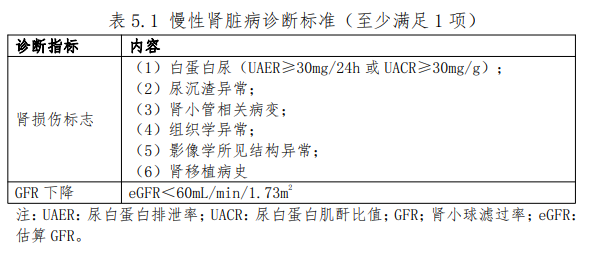Chronic kidney disease
What is Chronic Kidney Disease?
Chronic kidney disease (CKD) is characterized by chronic changes in kidney structure and function (lasting ≥ 3 months), with clinical manifestations varying depending on the underlying condition, cause, and severity of the disease.
CKD can be described from two perspectives:
1. Kidney Structural Damage:
Increased albuminuria (i.e., albumin/creatinine ratio [ACR] ≥ 30 mg/g or 3.4 mg/mmol), abnormal urine sediment microscopy, imaging abnormalities, pathological abnormalities, or kidney transplantation.
2. Declining Kidney Function:
The threshold for reduced glomerular filtration rate (GFR) is < 60 mL/(min · 1.73 m2).
CKD emphasizes the progressive nature of kidney disease. In the past, kidney disease was considered a rare and severe condition. The concept of CKD highlights that it is a common disease with varying severity, manageable by general physicians.
How is Chronic Kidney Disease Diagnosed?
CKD is diagnosed if either of the following criteria is met for more than 3 months:
1. Kidney damage (structural or functional abnormalities), including blood, urine, pathological, or imaging abnormalities, with or without reduced GFR.
2. GFR < 60 mL/min/1.73 m², with or without kidney damage.

Source: Dietary Guidelines for Adults with Chronic Kidney Disease (2024 Edition)
Which Department Should Chronic Kidney Disease Patients Visit?
Departments: Nephrology or General Internal Medicine.
What Causes Chronic Kidney Disease?
CKD has diverse causes, including:
- Primary or secondary glomerulonephritis;
- Diabetes;
- Hypertension;
- Chronic pyelonephritis;
- Drug toxicity;
- Autoimmune diseases;
- Ischemic nephropathy;
- Urinary tract obstruction;
- Hereditary kidney diseases;
- Kidney transplantation.
Who is at Risk for Chronic Kidney Disease?
It can occur at any age.
Historically, primary or secondary glomerulonephritis was the main cause in China. Now, hypertension, diabetes, and other chronic conditions are predominant.
What Are the Symptoms of Chronic Kidney Disease?
- Early-stage CKD often has no symptoms but may present with underlying conditions like hypertension, diabetes, elevated urinary albumin, or abnormal urine sediment, leading to delayed intervention.
- Later symptoms include:
- Fatigue;
- Anemia;
- Loss of appetite, nausea, vomiting;
- Endocrine disorders.
How is Chronic Kidney Disease Diagnosed and Staged?
Screening for CKD is recommended for individuals with hypertension, diabetes, chronic infections (hepatitis B/C, HIV), or long-term medication use. Tests include:
- Random urine ACR;
- Morning urine sediment test;
- Blood creatinine and cystatin C to estimate GFR;
- Kidney ultrasound or MRI for structural assessment.
Diagnosis involves three aspects:
- Cause;
- GFR staging (G1–G5);
- Albuminuria staging (A1–A3).
GFR Staging:
- G1−GFR > 90 mL/(min · 1.73 m²);
- G2−GFR 60–89 mL/(min · 1.73 m²);
- G3a−GFR 45–59 mL/(min · 1.73 m²);
- G3b−GFR 30–44 mL/(min · 1.73 m²);
- G4−GFR 15–29 mL/(min · 1.73 m²);
- G5−GFR < 15 mL/(min · 1.73 m²) or requiring dialysis.
Albuminuria Staging:
- A1−ACR < 30 mg/g (< 3.4 mg/mmol);
- A2−ACR 30–299 mg/g (3.4–34.0 mg/mmol);
- A3−ACR ≥ 300 mg/g (≥ 34.0 mg/mmol).
How is Chronic Kidney Disease Treated?
Treatment includes:
- Managing underlying conditions: e.g., controlling hypertension, diabetes, or lupus nephritis.
- Slowing disease progression: e.g., ACE inhibitors to reduce proteinuria or SGLT2 inhibitors for kidney protection.
- Treating complications: e.g., correcting renal anemia or secondary hyperparathyroidism.
- Adjusting drug doses based on eGFR to minimize side effects.
- Preparing for kidney replacement therapy when necessary.
What is the Prognosis for Chronic Kidney Disease?
Prognosis depends on:
- Cause and underlying conditions;
- GFR level;
- Degree of albuminuria.
Besides progressing to end-stage renal disease, CKD increases cardiovascular risks. Many patients die from heart disease or stroke before reaching uremia. Treatment aims to preserve kidney function and reduce cardiovascular risks.
How to Prevent Chronic Kidney Disease?
Prevention focuses on controlling risk factors like hypertension, obesity, and diabetes, while avoiding nephrotoxic drugs or foods.